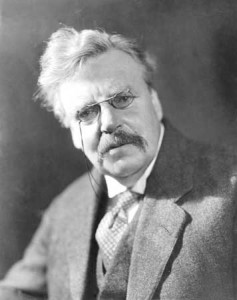Why Christianity insists on holidays like Christmas.
 [R]eligion always insists on special days like Christmas, while philosophy always tends to despise them. Religion is interested not in whether a man is happy, but whether he is still alive, whether he can still react in a normal way to new things, whether he blinks in a blinding light or laughs when he is tickled. That is the best of Christmas, that it is a startling and disturbing happiness; it is an uncomfortable comfort. The Christmas customs destroy the human habits. And while customs are generally unselfish, habits are nearly always selfish. The object of the religious festival is, as I have said, to find out if a man is still alive. A man can smile when he is dead. Composure, resignation, and the most exquisite good manners are, so to speak, the strong points of corpses. There is only one way in which you can test his real vitality, and that is by a special festival. Explode [fire]crackers in his ear, and see if he jumps. Prick him with holly, and see if he feels it. If not, he is dead, or, as he would put it, [he] is “living the higher life.”
[R]eligion always insists on special days like Christmas, while philosophy always tends to despise them. Religion is interested not in whether a man is happy, but whether he is still alive, whether he can still react in a normal way to new things, whether he blinks in a blinding light or laughs when he is tickled. That is the best of Christmas, that it is a startling and disturbing happiness; it is an uncomfortable comfort. The Christmas customs destroy the human habits. And while customs are generally unselfish, habits are nearly always selfish. The object of the religious festival is, as I have said, to find out if a man is still alive. A man can smile when he is dead. Composure, resignation, and the most exquisite good manners are, so to speak, the strong points of corpses. There is only one way in which you can test his real vitality, and that is by a special festival. Explode [fire]crackers in his ear, and see if he jumps. Prick him with holly, and see if he feels it. If not, he is dead, or, as he would put it, [he] is “living the higher life.”
G.K. Chesterton, The Illustrated London News (Amer. ed.), January 11, 1908, quoted in More Quotable Chesterton , pp. 412-13.


















